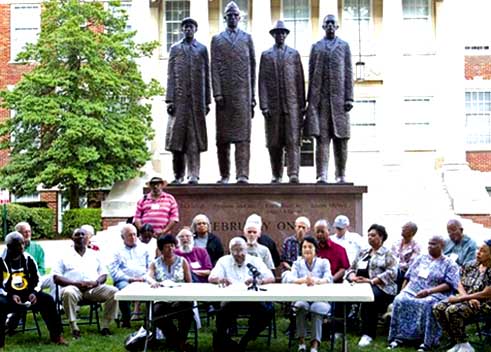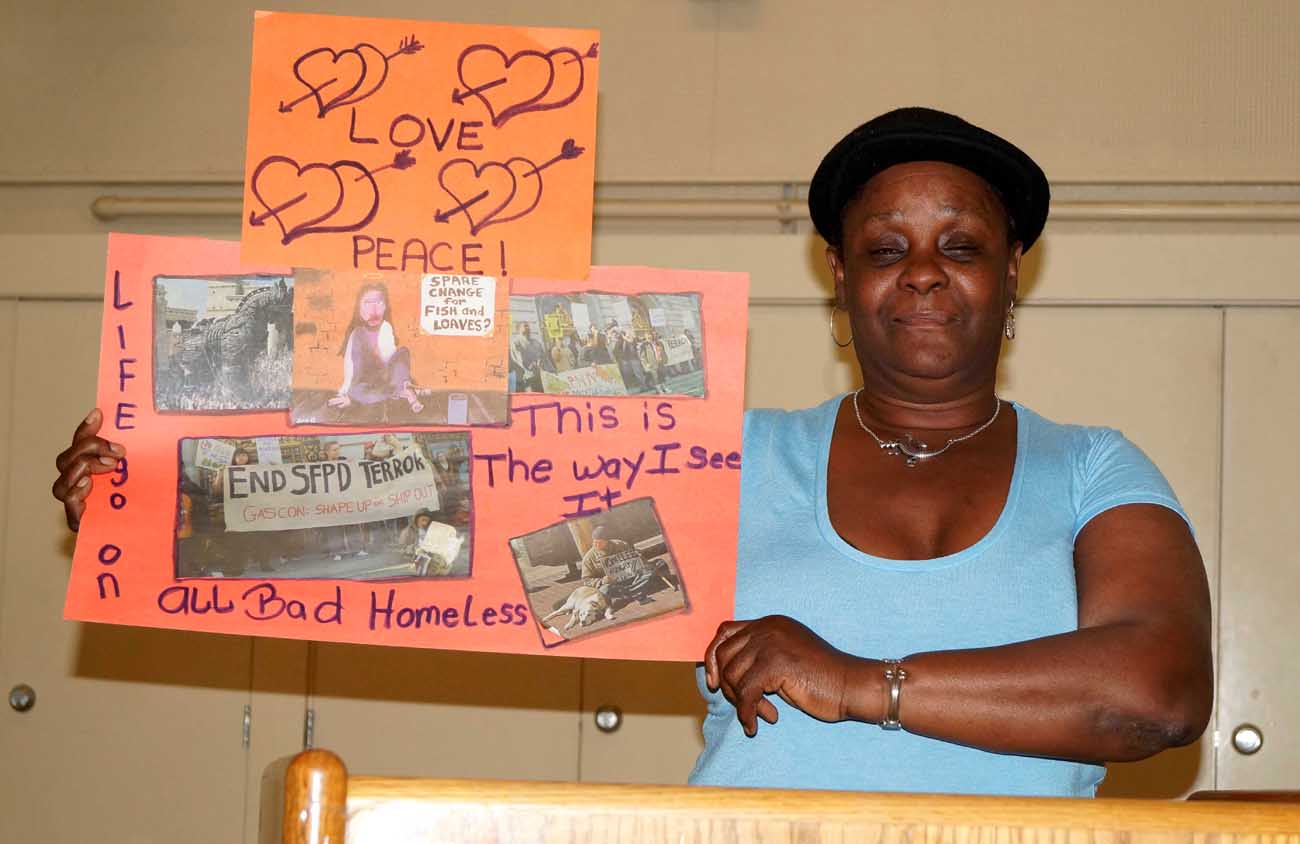
by Rev. Phil Lawson
[dropcap]T[/dropcap]he National Council of Elders was started in Oakland in 2009. I invited Dr. Vincent Harding, a historian who worked with Dr. King and was a speechwriter for Martin Luther King, and I invited my brother, Rev. James Lawson, a Methodist minister who was a confidante of Martin Luther King, to come to Oakland to speak in 2009. Jim had trained Martin in nonviolence and trained the Southern Christian Leadership Conference (SCLC) and the Student Nonviolent Coordinating Committee (SNCC) in the philosophy and practices of nonviolence.
Jim Lawson said that in the 20th century, the world witnessed the greatest advancements in human freedom that had ever before been achieved in the history of the world. That century saw the greatest advances in freedom and justice and humanity, more than ever before in history. But many people were ignorant of this and did not relish it or learn from it.
Out of that discussion in Oakland came the concept that there should be a National Council of Elders. Elders are, of course, persons of a certain age. But more importantly, many elders are persons who for the last 30, 40 or 50 years, have been working for justice and freedom and empowerment of people in the United States.
So we began to gather the names of men and women from the major movements of the 20th century: The labor movement, Dr. King’s movement, the youth movement, the Free Speech movement, and the women’s movement. We began to talk with the individuals from those movements to see if they would be a part of the National Council of Elders for the purpose of teaching the lessons of the 20th century so that we might transfer those lessons to the young people of the 21st century who are engaged in movements and engaged in being human beings and struggling with that in our nation.
Out of that beginning, Jim and Vincent and I began to organize the National Council of Elders. Then, in 2012, in Greensboro, North Carolina, the National Council of Elders was instituted when 23 elders gathered from all of these various movements — the farm workers movement, the labor movement, the cultural movements of the 1960s and Dr. King’s movement.
We organized in Greensboro, North Carolina, and the National Council of Elders made this statement as part of the Greensboro declaration: “We will undertake with you the work that we have been called for, doing everything in our power to bring a greater measure of justice, equality, and peace to our country and to the world.”
The National Council of Elders will have hearing sessions around the nation this year, in 2014, wherever elders are gathered. Elders have formed themselves into an organization to listen. We will listen to the community, listen to the cries of our people, to the concerns of our people, to the pains and aches and suffering of our people, so that we can get some understanding of how we can provide skills and tools for our young people to manage in this world today. We elders have a very special responsibility.
I began my own personal journey as a young man back in 1950, before the movement of Dr. King and Rosa Parks, when a group of young people, myself included, went to Washington, D.C., the summer after we graduated from high school, and began to learn and practice nonviolence as we tried to desegregate Washington, D.C. In 1950, Washington, D.C., was segregated into white and black lunch counters and swimming pools and movie houses.
Recently, someone asked me what inspired me to get engaged in the work for justice. I answered that I was not inspired, I was propelled. I was compelled because I was born in 1932 in the midst of the Depression. I grew up in segregation in northern Ohio, with segregated white lunch counters and black restaurants.
The very conditions under which I was born as a black man in this nation made it necessary for me to get engaged in fighting against the oppression that I saw. So all of us are called by the circumstances into which we were born in this nation, to get engaged in making America a better place for ourselves, and for our children and our grandchildren.
We did not ask for it. We did not start this struggle, but we were born into it. And the only thing we can do now is to struggle against it, but also live in it and learn how to be a human being, a full child of God, at the same time we are trying to change the racism, the sexism, the homophobia, the things that break us down and divide us and make us less of a people. I know I’m preaching to the choir!
So that’s our Council of Elders. It represents all of the major movements of the 20th century, and people are coming together and beginning to learn.
I grew up in a town where we would go to church and have Sunday dinner around the dinner table. My family, my sisters and brother, and my mother and my father, would count how many African Americans were lynched that week. As a boy, I remember in the black newspapers, they would publish every week how many of us got lynched across the United States.
So we started the hearing panels to listen to the cries of the people. Trayvon Martin had something to do with our understanding that to be born and to be a young black man, it is dangerous for them to walk around the street and simply be a human being because they are liable to run into somebody who is afraid for their life and who will shoot them, much like the lynchings when I grew up.
We have to do something about the attitude of the majority of people in the United States who are European Americans, about their fear of people of color, if they believe that they have the right to shoot if they are fearful. That’s a mentality, sisters and brothers, that we have to do something about. We have to change it because it threatens my grandson, a 20-year-old. It threatens his ability to walk around and be a full human being, because there are some people who are afraid of him and might kill him. There is much we have to do as elders. Because in the little time that I have left — I am 82 now — I want to make the world a little bit safer for my grandson than it is today, and that means you and I have a lot of work to do in our nation.
I believe strongly that the way we must learn justice in our land is by following the way of nonviolence, the way of Dr. King and Mahatma Gandhi, the way of love.
My great-grandfather was named Henry Dangerfield Lawson. He was a slave in Hagerstown, Maryland. At 16 years of age, he escaped and went up to Philadelphia and got on the Underground Railroad. He met the daughter of William Still, the head of the Underground Railroad in Philadelphia, and she traveled with him up the Underground Railroad through Pennsylvania and New York State and they crossed over into Canada, where my Dad was later born.
It is that spirit that causes us to say that we have to continue to fight to make this nation what it ought to be. Our grandfathers and grandmothers who were slaves, who were oppressed, decided that once they got free, they were going to stay in this country and make it what it ought to be.
And they decided that the way they were going to do that was through nonviolent Christian love, even winning over slave owners so that those slave owners and their children would become sisters and brothers of former slaves and the former children of slaves.

We decided that this was our nation and no one was going to run us out of it through their racism or their violence or their fears. I’d say we have that battle still to win.
The Book of Hebrews has these words: “Therefore, surrounded by so great a cloud of witnesses, let us lay aside every weight and sin that clings so closely to us and let us run with perseverance, the race that is set before us.”
I suggest to you that this race is still going on. We did not choose the race. Most likely, we will not end the race. But we have to run it. We have to run that race.
There is a flower in Africa that blooms every 80 years. Imagine that, a flower that blooms every 80 years! Imagine yourself watering that flower and planting the seeds of that flower. That’s a seed that may not bloom in your lifetime or in my lifetime. But continue to water it, continue to plant that seed, even if it does not bloom in your lifetime.
__________________________________________________________
St. Mary’s Center Celebrates Black History Month
Senior members of St. Mary’s Center in Oakland honored Black History Month by dedicating themselves to working for Freedom and Justice. Rev. Phil Lawson gave an eloquent presentation about the National Council of Elders. Then, Lola Hadley, Johna Wilcoxen and James McGee, senior members of St. Mary’s community, presented their own original reflections on what it means to face racism and injustice, and to search for a better tomorrow of equality and justice and freedom for all people.
I Got Tired
by Lola Hadley
I’m tired.
I’m ready to go through my past,
empty my suitcase, to have a future.
And people don’t know, don’t want to hear,
what it was like for Blacks to live in the South.
I watched my parents scrape to provide for
the family. They worked several jobs just for us.
They hid what we had from the
social service case workers.
I know what it was like, it wasn’t nice for us at all.
It wasn’t right or pretty, it wasn’t fair at all.
I had my auntie to talk to, she’d listen and
I’d feel better. She went through it too.
You’ve got to live it to understand.
In His Steps
by Johna Wilcoxen
The single criterion for judgment offered by Jesus
in his account of the World’s Final judgment
is our behavior toward the poor, the hungry,
the imprisoned, the homeless, the sick.
Jesus we pray for this frail, elderly woman, age 92,
who lives in fear of eviction by a wealthy landlord.
As we pray that the path to prosperity is not the
highway to homelessness,
Remember they too have dreams.
Let us all share the M.L.K. Jr. dream because
although we have a River of Tears
let us not have another year of darkness,
homelessness, or hunger.
The Eye of God is Watching.
What Will He See?
America
by James E. McGee
We call it America, the beautiful.
Beauty it is, but things that have happened in
the past are definitely not beautiful.
How many men have fallen because
of their color and their beliefs?
We think of Martin Luther King, Malcom X,
John F. Kennedy, Bobby Kennedy and many
others who died because they were
Black or because of their beliefs.
Martin Luther King and Malcom X
championed the cause for Racial Justice.
And the Kennedy brothers were killed
because of their supportive stands.
Rosa Parks supported Equal Rights in riding a
public bus. And Marilyn Monroe died because
of her association with the Kennedy brothers.
Many more Black men, women and children
died because of the color of their skin.
And we ask Why they DIED!!!
You and We get our Heaven and Hell
Right here on Earth. God Bless Us All.
